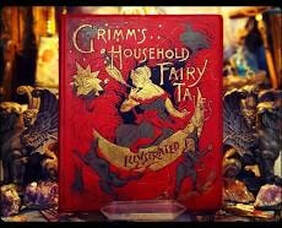Fairy
 As a kid, you ever get money from the tooth fairy? Did you have a favorite fairy tale?
As a kid, you ever get money from the tooth fairy? Did you have a favorite fairy tale?The word fairy has its origins in the Proto-Indo-European (PIE) root bha-(2)(to speak, tell, say) and Latin fatum (that which is ordained; destiny, fate), fae (fey; i.e., fated or doomed; prescient, able to tell the future), and fata (the Fates). In Roman mythology, the three Fates were Lachesis (the allotter), Clotho (the spinner), and Atropos (the unturnable, death). In brief, each person is fated to their lot in life (to being who you are), fated to the life which is spun out in front of them, and finally, fated to their death.
Hmmm… this seems like a long way from the ‘once upon a time’ fairy tales some of us grew up with—Snow White and the Seven Dwarfs, the Little Mermaid, Hansel and Gretel, Santa Claus and the elves at the North Pole, and so on.
The word fairie (fairy) came to English around 1300 meaning a place (not a creature); i.e., a fairie was the country or home of supernatural or legendary creatures; a fairyland. Fairie comes from 12th century Old French faerie (land of fairies, meeting of fairies; enchantment, magic, witchcraft, sorcery). The cute diminutive winged beings in children’s stories do not appear until the early 17th century.
The term ‘fairyland’, originally fairie, is from the 1580s.
The noun fairy-tale (an oral narrative centered on magical tests, quests, and transformations) is from 1749. The adjective fairy-tale (e.g., ‘a fairy-tale romance’) is from 1963.
By the way, an elf is traditionally defined as a mischievous young fairy.
Fairy tale or folk tale… what’s the difference? Generally speaking, folk tales are from ancient oral traditions with no known author. On the other hand, fairy tales, generally speaking, emerge from folk tales and are written down by recognized authors (e.g., the Grimm brothers).
Reference: Online Etymological Dictionary, https://www.etymonline.com/
Published on May 28, 2021 20:23
No comments have been added yet.



